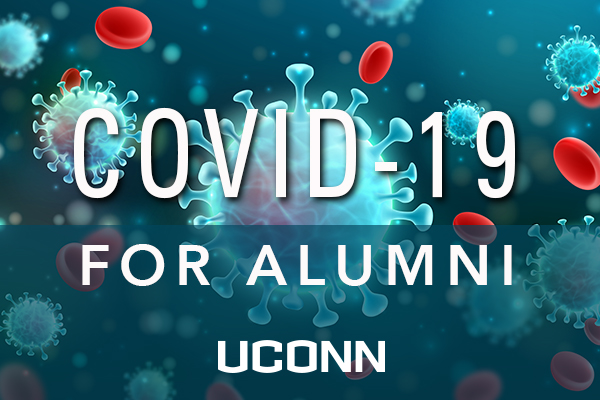UConn alumni now have the opportunity to take the same online class about the COVID-19 pandemic that was wildly popular during the spring and early summer semesters with students, faculty, and staff.
The class – “The COVID-19 Pandemic: Impacts on Health, Business, and Society” – was first taught virtually in the spring and was completed by 4,200 undergraduates, making it the largest class in UConn history. Another 650 undergrads are taking the course this summer while some 1,200 faculty and staff have also completed it.
The class was originally taught in one six-week module, but for alumni it will be given in three two-week modules at no cost. The first, called “The Underlying Science Behind the COVID-19 Panic,” begins on Monday, June 21, while “Managing Health Crises: Federal, State, Local and Individual Action” begins on Monday, July 6, and “The Effect of a Pandemic on Employees and Businesses” starts on Monday, July 20.
To register for the first segment of the class, visit this section of the UConn Alumni Husky Hub.
“Students really valued the multidisciplinary perspective of the class,” says UConn Assistant Vice Provost for the Center for Excellence in Teaching and Learning (CETL) Peter Diplock. “They were able to hear from faculty that represented different disciplines about the same topic. If you think about it, we silo education a lot, with a three-credit class on this and a three-credit class on that. Problems like COVID don’t present themselves that way. They are mess and you have to make sense of it in many different ways.”
The decision to split the alumni offering into three different modules was based on the characteristics of adult learners.
“As adults, we have competing commitments,” says Diplock. “Our alumni are balancing work, home, teaching children at home, and worried about parents in high-risk groups. A course like this is of great value. The information is source-credible and vetted by the faculty. We also know that a two-week time period reflects the attention span of people who have a lot of commitments. Maybe one of the two-week classes is of more interest to them than the others, and they don’t have six weeks to give.”
The modules are presented in a non-linear way so the adult learner can pick what interests them the most, although linear learning is still the recommended method. There are no grading assessments, but there are practice questions and self-knowledge checks. There is also the opportunity for students to participate in discussions with fellow students and faculty in discussion boards.
Each module will contain four lectures by different University faculty. In the first module, the lectures will be about the science of the virus and how it makes people sick; the evolution of the virus; the development process of a vaccine; and drug therapy, including antiviral therapies.
Diplock and Ruth Kustoff, Senior Strategist Non-credit Online Learning and Workforce Development, are moderating the first module.
“I am truly excited for our alumni to be able to participate in this type of learning,” says Vice President for Alumni Relations and Communications Mo Cotton Kelly. “I am also thankful for the partnership with the CETL, they have been wonderful campus partners.”



